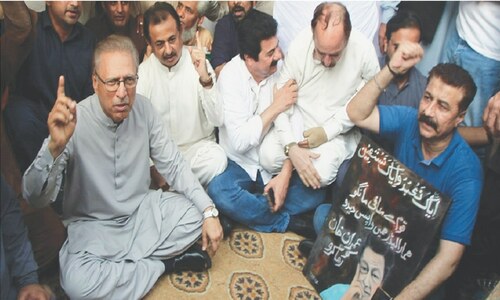BAGHDAD, May 14: A string of deadly attacks ripped through the Iraqi capital on Sunday, killing at least 26 people and wounding nearly 70, police said. Six small Shia shrines also were damaged in a series of blasts around the Baqouba, a mixed Sunni-Shia region where sectarian tensions are running high.
Elsewhere in Iraq, 15 people died in other attacks, including two British soldiers who were killed in a roadside bomb attack in southern Iraq on Saturday night.
Baghdad’s deadliest attack on Sunday involved two suicide car bombs that exploded near a main checkpoint on a four-lane road leading to Baghdad’s international airport, killing at least 14 Iraqis and wounding six. The other 12 Iraqis were killed by four roadside bombs, three targeting Iraqi police patrols and one that exploded in an open market.
The surge of violence occurred as Iraq’s parliament met in Baghdad, and Prime Minister-designate Nouri al-Maliki met privately with politicians in an effort to form a cabinet for a new national unity government _ one the Americans hope can help reduce sectarian violence and one day make it possible for U.S. forces to withdraw from Iraq.
His effort was set back on Sunday when a member of an influential Shia alliance threatened to unilaterally form a new government, if rival groups did not scale back their demands for cabinet ministries. At the same time, Sunni Arabs threatened to withdraw entirely from the political process.
Al-Maliki faces a May 22 constitutional deadline to form the cabinet.
The attacks on the Shia shrines near Baqouba began about 7:15am on Saturday when one or more bombs exploded inside the Tameem shrine, according to US military spokesman Lt-Col Barry Johnson.
Other attacks occurred throughout the day at five other shrines east of Baqouba, capital of the religiously mixed Diyala province 55 kilometers northeast of Baghdad and one of the flash points of sectarian tensions.
“These are terrorist attacks meant to divide Iraq’s Shia and Sunni Arabs, but if God is willing, they will not succeed,” said Mohammed Hussein, 45, a businessman in Baqouba.
The shrine attacks could have significant repercussions _ particularly in the Baqouba area, a mixed Sunni Arab-Shiite region where sectarian tensions are running high.
On Feb 22, bombs heavily damaged the Golden Dome in Samarr. That attack triggered a wave of reprisal attacks against Sunnis, dramatically escalating sectarian tension and pushing the country to the brink of civil war.—AP














































Dear visitor, the comments section is undergoing an overhaul and will return soon.